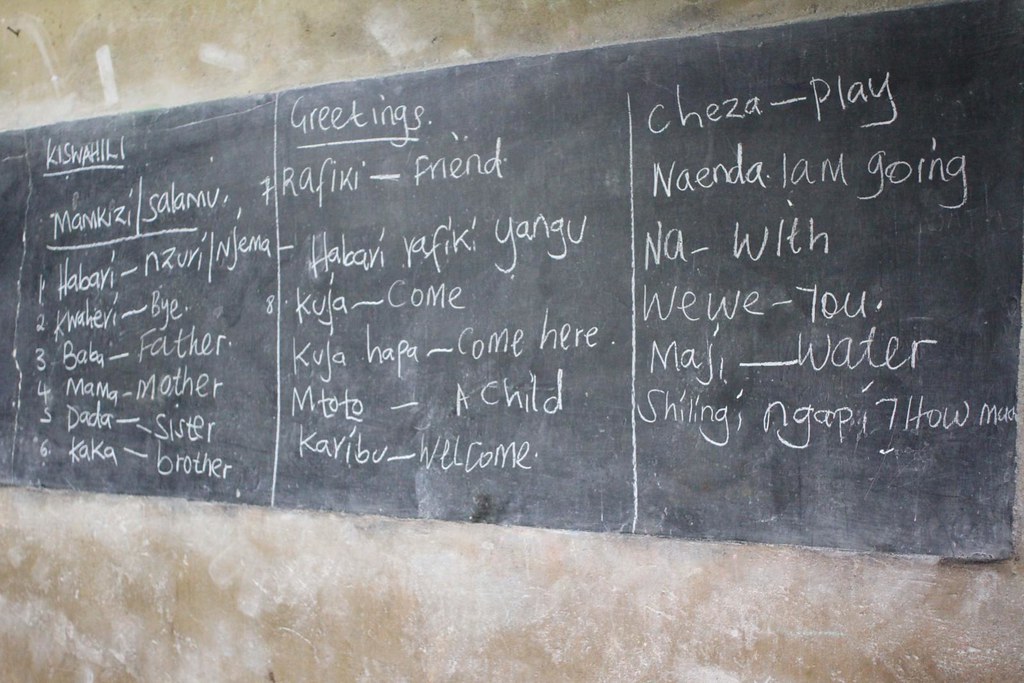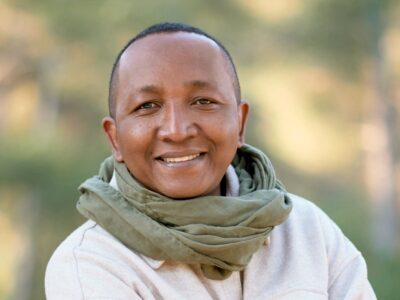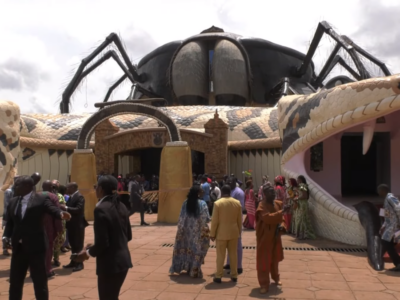
“Fehezanteny kiswahili” avy amin’i ultraBobban, lisansa CC BY-NC 2.0
Tamin'ny volana Novambra 2021 nandritra ny fivoriana faha-41 tany Paris, nanambara ireo Firenena Mpikambana ao amin'ny UNESCO fa Andro Maneran-tany ho an'ny Teny Kiswahili ny 7 Jolay — fantatra amin'ny anarana hoe Swahili — fiteny Bantu teratany any Afrika Atsinanana sy Afovoany ampiasain'ny olona 80 tapitrisa eo ho eo na amin'ny maha-fitenin-drazana azy na fiteny faharoa hay tsara.
Na dia midadasika aza izy io, dia maro maneran-tany no tsy mahafantatra ny maha-zava-dehibe sy ny tantaran'ny Swahili. Niresaka tamin'i Hannah Gibson, mpampianatra ambony ao amin'ny Departemantan'ny Fiteny sy ny Haifiteny ao amin'ny Oniversiten'i Essex ny Global Voices, momba ny tetikasa vaovao maharitra efa-taona mitondra ny lohateny hoe ‘Fiovaovana amin'ny fitsipi-pitenenana amin'ny teny Swahili: fifandraisana, fiovana sy mari-panondroana‘ izay natombony sy ireo mpiara-miasa aminy mba hahatakarana tsara kokoa ny fiovaovan'ny tenim-paritra ankehitriny amin'ny teny Swahili.
Amin'ity tafatafa ity, maheno avy amin'ny ekipan'ny tetikasa: Hannah Gibson (Oniversiten'i Essex), Fridah Kanana Erastus (Oniversiten'i Kenyatta), Tom Jelpke (Oniversite SOAS Londra), Lutz Marten (Oniversiten'i Londra), Teresa Poeta (Oniversiten'i Essex), ary Julius Taji (Oniversiten'i Dar es Salaam) momba ny tanjona sy ny fiantraikan'ny tetikasa, ary ny anjara asan'ny teny Swahili maneran-tany sy any Afrika Atsinanana isika. Miresaka ny antony maha zava-dehibe ny fanekena ny teny Kiswahili eo amin'ny sehatra manerantany amin'ny fanampiana olona maro kokoa ho liana amin'ny fianarana ny fiteny ihany koa izy ireo.
Global Voices (GV): Inona no ifantohan'ity tetikasa fikarohana efa-taona ity?
Project Team (PT): This project looks at how the Swahili language varies depending on the various places where it is spoken, as well as the different groups of people who speak it. In addition to being the first language of some communities on the coast of East Africa, Swahili is used as a lingua franca by many others and now has over 100 million speakers.
With Swahili being spoken in so many diverse contexts, we expect there to be a lot of variation in how the language is used on day-to-day basis.
In the past, we know scholars have described some of the dialects on the coast. And more recently some of the “newer” varieties — such as Swahili spoken in DRC or Sheng — are being talked about. But there is no in-depth study of variation in present-day Swahili nor of the ways speakers use this variation for different purposes. That’s what this project aims to explore.
Ekipan'ny Tetikasa (ET): Mijery ny fisian-karazan'ny teny swahili arakaraka ny toerana misy azy, sy ny vondron'olona samihafa miteny azy ity tetikasa ity. Ankoatra ny maha fiteny voalohany an'ny vondrom-piarahamonina sasany any amin'ny morontsirak'i Afrika Atsinanana, ampiasain'ny maro hafa ho teny ifaneraserana ny swahili ary manana mpiteny 100 tapitrisa mahery ankehitriny.
Amin'ny fampiasana ny teny Swahili amin'ny odidina maro samihafa, manantena izahay fa hisy fiovaovana betsaka amin'ny fomba fampiasana ny fiteny isan'andro.
Taloha, fantatray fa nisy manam-pahaizana namariparitra ny fitenim-paritra sasany tany amorontsiraka. Ary vao haingana indrindra, noresahina ny sasany amin'ireo karazany “vaovao kokoa” – toy ny Swahili ampiasaina any RDC na Sheng. Saingy tsy misy fandalinana lalina momba ny fiovaovana amin'ny teny Swahili ankehitriny na ny fomba fampiasan'ireo mpampiasa azy ity fiovaovana ity amin'ny tanjona samihafa. Izany no tanjon'ity tetikasa ity hosavasavaina.
GV: Inona avy ireo fanontaniana sasany antenainao hovaliana momba ny fiovaovan'ny tenim-paritra amin'ny teny Swahili?
PT: Firstly, we want to gain a better understanding of the present-day variation in Swahili. And while traditionally the linguistic focus has been more on pronunciation and lexical variation (the way words differ in various dialects), we will focus on the structural differences — for example the different ways in which sentences are constructed.
The second set of questions we want to answer is how this variation is linked to the linguistic environments in which Swahili is spoke. Many East African contexts are highly multilingual, with people using several languages on daily basis. In our project, we ask how the contact between Swahili and various other languages in Kenya and Tanzania results in the languages influencing each other.
Lastly, we are interested in what these different Swahili varieties mean for speakers and their identities and how speaking a certain dialect may impact — or reflect — various societal issues.
ET: Voalohany, tianay ny hahazo fahatakarana tsara kokoa ny karazany ankehitriny amin'ny teny swahili. Ary raha amin'ny fomba mahazatra, mifantoka kokoa amin'ny fanononana sy ny fiovaovan'ny voambolana (ny fomba fiovaovan'ny teny amin'ny fitenim-paritra samihafa) ny fifantohana amin'ny fiteny, hifantoka amin'ny fahasamihafan'ny rafitra isika — ohatra ny fomba samihafa amin'ny fananganana fehezanteny.
Ny andiam-panontaniana faharoa tianay hovaliana dia ny fomba ifandraisan'io fiovaovana io amin'ny tontolon'ny fiteny izay ampiasaina ny teny swahili. Maro amin'ireo toe-javatra (odidina) Afrikana atsinanana no tena manana fiteny maro be, ary misy ny olona mampiasa fiteny maro isan'andro. Amin'ny tetikasanay, manontany izahay hoe ahoana no fifandraisana misy eo amin'ny teny Swahili sy ny fiteny maro samihafa ao Kenya sy Tanzania eo amin'ny fifampitana tarakevitra.
Farany, mahaliana anay ny dikan'ireo fiovaovana samihafa amin'ny teny Swahili ho an'ireo mpampiasa azy sy ny maha-izy azy ary ny hoe ahoana ny fampiasana ny fitenim-paritra sasany no mety hisy fiantraikany — na mitaratra ny — olana samihafa eo amin'ny fiaraha-monina.
GV: Iza no manao ity fikarohana ity? Ary nahoana no zava-dehibe aminao ity tetikasa ity?
PT: The project is a collaboration between four different universities across three countries — Kenya, Tanzania, and the UK. Our team is made up of colleagues from Kenyatta University, SOAS University of London, University of Dar Es Salaam and University of Essex — each bringing their own set of skills and experience to the project.
We are very excited to embark on this study and to be able to focus on the role played by Swahili. Linguistic studies on dialects and variation in major languages tend to focus on European contexts or take the Global North as the starting point (for example through the study of English), so we are excited to be putting Swahili at the centre the study.
ET: Fiaraha-miasa eo amin'ny oniversite efatra samihafa manerana ny firenena telo – Kenya, Tanzania ary UK ny tetikasa. Ahitana mpiara-miasa avy ao amin'ny Oniversite Kenyatta, Oniversite SOAS ao Londra, Oniversiten'i Dar Es Salaam ary Oniversiten'i Essex ny ekipanay- samy mitondra ny fahaizany sy traikefany amin'ny tetikasa.
Nientanentana fatratra izahay hanomboka ity fikarohana ity sy afaka hifantoka amin’ny anjara asan’ny Swahili. Mirona hifantoka amin'ny toe-javatra Eoropeanina na maka ny Ilabolantany avaratra ho teboka fiaingana (ohatra amin'ny alalan'ny fianarana teny anglisy) ny fikarohana fiteny momba ny fitenim-paritra sy ny fiovaovana amin'ny fiteny lehibe, noho izany dia faly izahay mametraka ny Swahili ho ivon'ny fikarohana.
GV: Ahoana no maha-zava-dehibe an'ity tetikasa ity amin'ny toejavatra ankehitriny sy ny fivoaran'ny teny Swahili?
PT: The number of Swahili speakers is growing. So is the number of places where Swahili is used and taught. A better understanding of Swahili varieties has many uses and implications. For example, it can influence how the language is taught. It can help us to better understand how speakers use Swahili and what information they can access in it. It can also give us insights into what Swahili means for the speakers’ sense of identity and community and how this continues to change.
From an academic perspective, this study contributes to, expands and builds on the rich scholarly tradition of work on the Swahili language.
ET: Mitombo ny isan'ny mpiteny Swahili. Toy izany koa ny isan’ny toerana ampiasaina sy ampianarana ny teny Swahili. Manana fampiasana sy fiantraikany marobe ny fahatakarana tsara kokoa ny karazana Swahili . Ohatra, mety misy fiantraikany amin'ny fomba fampianarana ny fiteny izany. Afaka manampy antsika hahatakatra tsara kokoa ny fomba fampiasan’ireo mpiteny ny Swahili sy izay fampahalalana azon'izy ireo idirana amin'izany. Afaka manome antsika fahalalàna lalina kokoa ny dikan'ny Swahili eo amin'ny lafiny maripanondroana sy fiaraha-monina ihany koa izany ary ny fomba fitohizan'izany fiovana izany.
Avy amin'ny fomba fijery akademika, manampy, manitatra ary manorina ny fomba fiasa mahazatra amin'ny teny Swahili ity fikarohana ity.
GV: Rahoviana no ho vita ny tetikasa ary ahoana no ahafahan'ny olona mahita izao hita tamin'izany?
PT: The project is funded by the Leverhulme Trust and lasts for four years. Having just started in September 2021 it will be completed in August 2024. As well as the project website — to be launched soon — which will have regular updates, the broader findings will also be made available online.
It is important to us that any resources we gather are freely available to anyone interested in them and for people wanting to further work on the Swahili language.
PT: Ny Leverhulme Trust no mamatsy vola ny tetikasa ary maharitra efa-taona. Vao nanomboka tamin'ny volana Septambra 2021 ary hifarana amin'ny volana Aogositra 2024. Hatomboka tsy ho ela ihany koa ny tranokalan'ny tetikasa — izay hisy fanavaozana tsy tapaka, ho hita amin'ny aterineto ihany koa ny fikarohana midadasika kokoa.
Zava-dehibe aminay ny hoe azon’ny olona rehetra liana amin'izany sy ho an’ny olona te hiasa bebe kokoa amin’ny teny swahili hidirana maimaim-poana ny loharano nangoninay.
GV: Nanambara ny UNESCO tamin'ny volana lasa fa Andro Maneran-tany ho an'ny teny Kiswahili ny 7 Jolay. Ahoana ny fihetsehem-ponao manokana sy amin'ny maha mpikaroka ny fiteny manoloana izany fanambarana sy fankatoavana izany
PT: We were excited to hear the news and we will celebrate Swahili with a project event on that day for sure!
ET: Nientanentana izahay nandre ny vaovao ary hankalaza tokoa ny teny Swahili amin'ny lanonan'ny tetikasa amin'io andro io!
GV: Nahoana no zava-dehibe io fankatoavana io?
PT: It’s great to see an African language celebrated at a more international and global level — it is long overdue. Swahili as a language, its significance and history as well as its status today is unknown to many people around the world and this recognition can help us all to learn more about it – perhaps even get people excited to try and learn it too!
Our hope is also for Swahili to be celebrated in its complexity — with its many varieties and dialects, with the diverse groups of Swahili speakers for whom this language can mean different things and together with the varied and multilingual environments where it is spoken.
ET: Mahafinaritra ny mahita teny afrikanina ankalazaina eo amin'ny sehatra iraisam-pirenena sy manerantany kokoa — efa ela be izany. Tsy fantatry ny olona maro manerana izao tontolo izao ny Swahili amin'ny maha-teny azy, ny maha-zava-dehibe azy sy ny tantarany ary ny satany ankehitriny ka ity fankatoavana ity no afaka manampy antsika rehetra hianatra bebe kokoa momba azy – mety hahatonga ny olona hientanentana hanandrana sy hianatra izany koa aza!
Ny antenainay koa dia ny hankalazana ny teny Swahili ao anatin'ny fahasarotany — amin'ireo karazany sy fitenim-paritra maro, miaraka amin'ireo vondrona mpiteny Swahili samihafa izay ahafahan'ity fiteny ity midika zavatra samihafa ary miaraka amin'ny tontolo isan-karazany sy amin'ny fiteny maro itenenana azy.
GV: Inona no mety ho voka-dratsy amin'ny fotoana fohy sy maharitra amin'ny fahatongavan'ny Swahili ho fiteny Afrikana voalohany nahazo izany voninahitra izany?
PT: Hopefully, this can also be the start of an international celebration of many more African languages. Swahili is a major language and it is great to see it acknowledged and celebrated. It is also important it doesn’t end up being the sole representative of an entire continent but rather an example of the incredible linguistic diversity which surrounds it.
ET: Antenaina fa mety ho fanombohan'ny fankalazana iraisam-pirenena amin'ny fiteny Afrikana maro hafa koa izany. Fiteny lehibe ny Swahili ary mahafinaritra ny mahita azy nekena sy ankalazaina. Zava-dehibe ihany koa fa tsy hiafara ho solontena tokana amin'ny kaontinanta iray manontolo izy fa kosa ohatra amin'ny fahasamihafan'ny fiteny tsy mampino izay manodidina azy.
GV: Ahoana no ahafahan'ny olona mahafantatra bebe kokoa momba ilay tetikasa?
PT: Watch this space! We will hopefully be doing regular updates for Global Voices online. So we will be back to let you know how we are getting on.
ET: Jereo ity tahala ity! Manantena izahay fa hanavao tsy tapaka ny Global Voices anjotra. Noho izany dia hiverina izahay hampahafantatra anao ny fandehanay.







